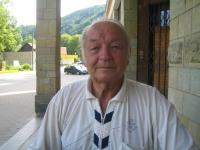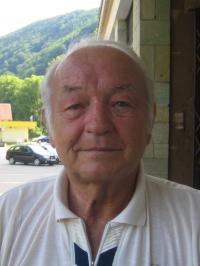I wanted to fight for change

Stáhnout obrázek
Jiří Krčmář was born on October 24, 1941, in the small village Česká Rybná near Žamberk. For generations his family owned a large farm with an area of about 20 hectares of fields and pastures. Shortly after 1948, Jiří’s father was branded a kulak – a peasant detrimental to national interests. The Communists henceforth burdened the family with absurdly high levies of crops. When they didn’t deliver, penalties followed. Thus, the Communists seized the nearly new tractor which made it even more difficult to deliver the levies. Jiří’s father was an educated and friendly person and a respected member of the community who took care of the local chronicles and often spoke at funerals. In 1953, the chairman of the committee was displeased by one of his speeches on the subject of the liquidation of private farmers. In a subsequent trial Jiří’s father was sentenced to one year and eight months in prison for sedition. Shortly afterwards, Jiří’s sister was dismissed from school and his older brother wasn’t admitted to the school where he wanted to study. One year after he had returned from prison, his father was convicted again but luckily he was amnestied and didn’t have to go to jail once more. While the family managed to meet the levies with difficulty, not much of the crops was left for the family. The escalating pressure was unbearable and thus his father joined the cooperative in 1957 being one of the last ones to join. Jiří Krčmář was embittered by his father’s imprisonment and the communist bullying. Being under much pressure, he didn’t pass his school-leaving exam and was dismissed from grammar school. Subsequently, he decided to start his own fight against the Communists. He would carry out sabotage acts in agriculture and produced and disseminated anti-regime leaflets. In 1960, he was revealed and sentenced to three and a half years for sabotage and damage to socialist property. The imprisonment took place at a correctional facility in Příbram, where he spent his time working in a mine. After his release, he decided that rather than to live without freedom, he’d try to escape to the West. He made plans for his getaway. In 1964, he went via Eastern Germany to Berlin, where he wanted to get past the wall. Before reaching his goal, however, he was arrested by the police and taken back to Czechoslovakia. For his attempt to escape from the country, the court imposed a two-year sentence on him. He served his term in Ostrov nad Ohří. After his return from prison, he had to start working in a factory in Žamberk so that the Communists could supervise him. Shortly afterwards he married and continued to dream about freedom. However, as he already had a family and children, he refrained from any other escape attempts in their interest. After the revolution, Jiří Krčmář became one of the founding members of the branch of the Confederation of Political Prisoners in Rychnov nad Kněžnou, where he now serves as chairman of the organization.

